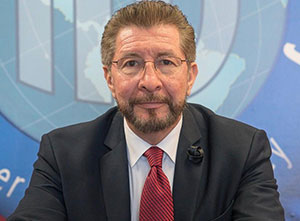Geopolitical Change in the Americas: Democracies Against Crime

By: Carlos Sánchez Berzaín - 14/09/2025
Share:
The geopolitics affecting the 35 countries of the Americas is changing. The relationship between political power and territory, marked by who and how political power is assumed and exercised, has been diffuse and contrary to democracy throughout this century, allowing organized crime to seize power through the expansion of the Cuban dictatorship and the penetration of China, Russia, and Iran. The new United States foreign policy is changing regional geopolitics and seeking to remove crime from political power.
Let us remember that "geopolitics is the political and strategic science that studies the relationship between territory and political power." It is articulated through the foreign policy of states, which is "the set of actions designed and implemented by a government to promote, defend, and enforce its country's interests in the international arena."
The 1990s were a time of strengthening and consolidating democracy in the Americas, marked by the fall of the Berlin Wall, the collapse of the Soviet Union, and the end of the Cold War with the triumph of capitalism over communism. Of the 35 states in the region, 34 were democracies, and only Cuba ended the 20th century as a dictatorship in crisis. But the scenario changed when Hugo Chávez became president of Venezuela in 1999, leading to the recovery and expansion of the Cuban dictatorship and changing regional geopolitics.
The first 25 years of this century in the Americas were marked by the expansion of the Cuban dictatorship, which came to lead Latin America at the 2015 Summit of the Americas in Panama. The agreement between Hugo Chávez, Fidel Castro, and Lula da Silva, which began operating with a low profile in 1999, became a powerful system—today 21st-century socialism or Castro-Chavism—based on Venezuelan oil, Cuba's subversive and criminal expertise that implemented and exported its methodology of state terrorism, transnational corruption with federal resources from Brazil under Lula's command known as Lava Jato, the withdrawal of the United States from the region with its change in foreign policy after the terrorist attacks of September 11, 2001, criminal activities from power with impunity, the persecution of democratic leaders, the destruction of the party system, and more.
We went from one dictatorship in 1999 to five with Cuba, Venezuela, Ecuador, Nicaragua, and Bolivia, of which only Ecuador returned to democracy thanks to the courageous actions of President Lenin Moreno. A geopolitical scenario in which dictatorships are narco-states led by Cuba with its main platform in Venezuela, which opened the region to the dictatorships of China, Russia, and Iran, which destabilize democracies—including the United States—with "hybrid warfare" operations ranging from forced migration, drug trafficking, transnationalized common crime, and human trafficking, to internal destabilization, the penetration of institutions, terrorism, assassinations, and more, with anti-imperialist rhetoric and the legitimization of crime.
For national security reasons, U.S. foreign policy has shifted, identifying perpetrators in forced migration, drug trafficking, terrorism, and other crimes, breaking the pretext of covering up crime through dictatorially usurped political power, as is the case with the "Cartel of the Suns" that controls Venezuela. Several countries, such as Argentina, Peru, Ecuador, the Dominican Republic, Paraguay, and Costa Rica, have adopted the same foreign policy, targeting the narco-terrorist group that dominates Venezuela, while regimes in Cuba, Bolivia, Nicaragua, Colombia, Brazil, Mexico, and Honduras protect the aforementioned cartel.
In the fight against transnationalized common crime, Ecuador, Chile, El Salvador, Peru, and others have taken law enforcement measures, and even Mexico has proceeded with the extradition of accused drug traffickers who had resisted extradition, claiming sovereignty. Governments and regimes throughout the region understand that crime must be removed from political power, and there is a growing—previously lacking—efficiency in the fight against crime.
The presence of Chinese investments, the expansion of the Silk Road, and its operations in the Panama Canal and in important areas of various Latin American countries are under scrutiny. Iran's presence and expansion are being revealed throughout the region. Lula, using the power of Brazil, continues trying to maintain the status quo with nationalist and anti-dollar rhetoric. The regime is weakening in Bolivia, where it appears likely to lose power, but is not willing to relinquish power. The greatest tension is centered on US military operations in the Caribbean regarding the narco-terrorism of the Cartel of the Suns, and more.
Objective reality has changed. Crime has been identified and will be separated from politics and power. Dictatorships are weakening, and people are accelerating their recovery of freedom. Governments are realigning themselves in the fight against crime, and geopolitics is now a different story.
*Lawyer and Political Scientist. Director of the Interamerican Institute for Democracy
«The opinions published herein are the sole responsibility of its author».